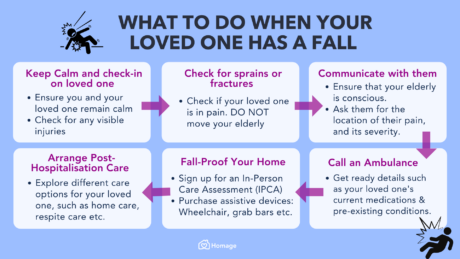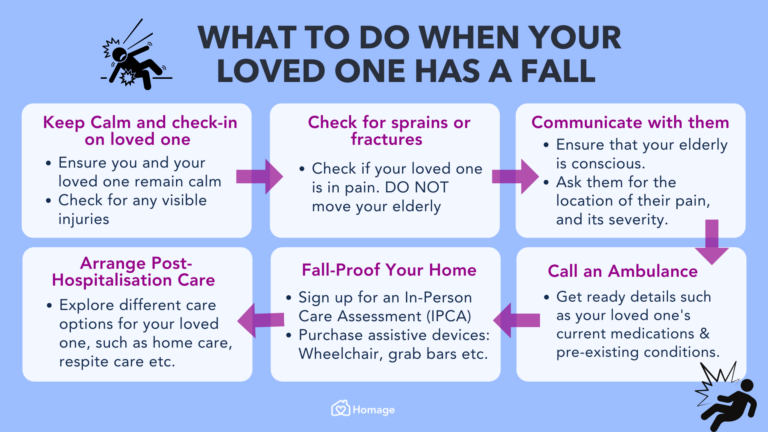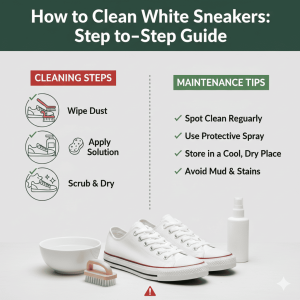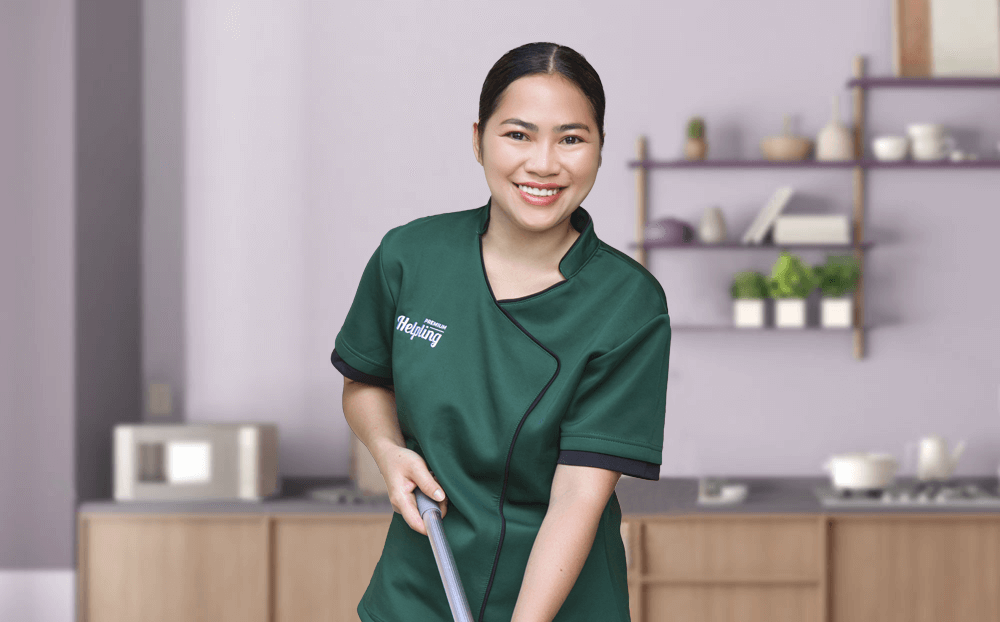This article first appeared on Homage.
Homage is an award-winning personal care solution that provides on-demand holistic home and community-based caregiving and medical services to seniors and adults, allowing them to age and recover with grace, control and dignity.
Falls are common among elderly adults. Globally, one in three adults above the age of 65 suffers a fall once a year. Closer to home, about 277 in 100,000 elderly above the age of 60 fall down, and about one-third of older people aged 60 and above have fallen more than once, according to a report in 2012.
The risk of falling increases with age, and it can happen at any time. It is important for us to know what to do after our loved one falls, and how we can continue to prevent falls for them.
New to Helpling? Click here to keep your house clean and your loved ones safe.
Immediately After the Fall
Upon finding out that your loved one has just fallen down, it is normal to panic and be flustered, and not know what to do. First of all, do not panic. It is important that you stay calm so as to help your loved one better. Immediately after a fall, it can be unclear whether medical attention is needed in some cases, as it may seem like a harmless fall.
When in doubt, do not hesitate to call 995 for an ambulance. Even though it may seem like you are overreacting, the paramedic will be able to assess whether further medical treatment is warranted, as some injuries are internal and are not visible to the naked eye. Do not move the elderly around if you are unsure he or she can be moved, in the event movement accidentally exacerbates the pain or worsens your loved one’s condition. You may hurt yourself accidentally in trying to help shift your loved one, without the proper techniques and know-how to move a fallen person.
Here are some steps and tips to follow when your loved one has just suffered a fall.
- Help your loved one to remain calm by asking them to take slow, deep breaths to relax more. Also, remember to calm your own nerves by practising deep breathing, or giving yourself time to take in the situation.
- Examine them for any visible injuries, such as bruises, bleeding, possible sprains and broken bones or fractures from the fall. This will help to determine the extent of the injury and whether emergency medical treatment is warranted.
- If they are alert, ask them whether they are experiencing any pain, its location, and how severe the pain is.
- If your loved one is experiencing a lot of pain, do not attempt to move them. Call the ambulance immediately and wait for further instructions.
- Should there be bleeding, you can stop the bleeding by applying gentle pressure with a sterile bandage or clean cloth over the wound, before dressing it with bandages.
If Your Loved One Did Not Have a Serious Fall
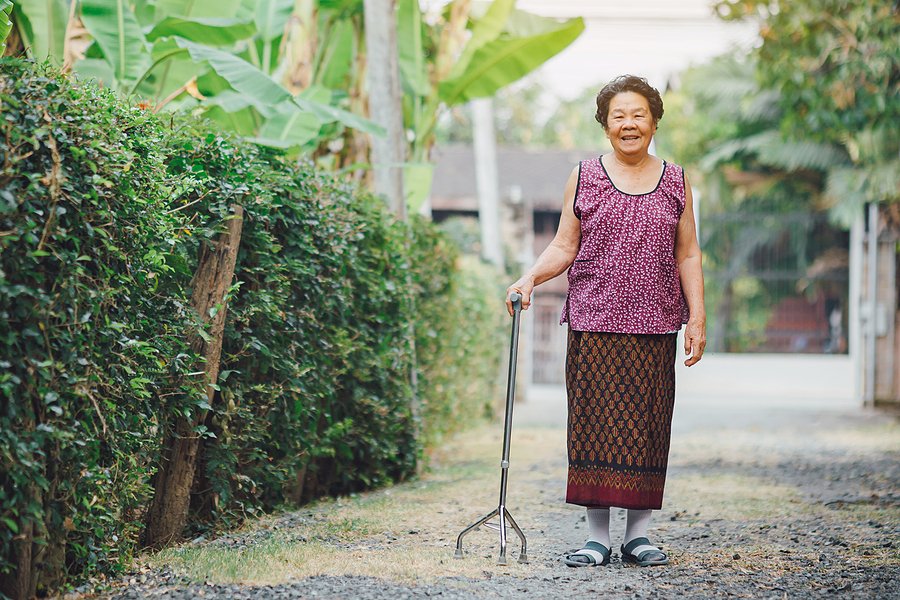
Follow these steps if the fall does not require any additional medical attention, such as continuous bleeding and/or fractures and broken bones.
- If your loved one is not badly hurt and wishes to get up from the ground, do proceed slowly and carefully. Ensure that they are comfortable for a smoother transition from the ground back up. Also, it is crucial to remember that your role is not to lift their weight and carry them up, but to provide assistance and support for them to get up. Your loved one must be able to physically get up by themselves. If your loved one is unable to do so, do consider calling for assistance using the non-emergency ambulance.
- If your loved one gets stuck, experiences pain, or gets tired from the effort and strain in the midst of getting up, do not rush them. Stop and wait for them to feel better before continuing to help them up.
- You will need two sturdy chairs to help them. Place one of the chairs next to your loved one’s head, and the other chair by their feet.
- Help your loved one to roll over on their side, and to get on their hands and knees to prepare for getting up. Place a towel underneath them to help them feel more comfortable, especially if they suffer from sore knees.
- Move the chair closest to their head directly in front of where they are so that they can use the chair as assistance to get up by placing their hands on the seat. They should be in a kneeling position after this adjustment.
- Have your loved one lean forward on the seat, as you ask them to simultaneously bring their strongest leg forward, leading with the knee, to place their foot flat on the ground. At the end of this step, your loved one should look like they are assuming a kneeling lunge position.
- Move the second chair directly behind your loved one. Ask them to use both their arms and legs to push themselves up, and then sit back into this chair. For this step, your loved one should be doing the work of getting up themselves; you can use your hands to keep them steady but do not pull them up or provide assistance to lift their weight.
- Let your loved one rest on the chair and stay seated until you are confident that they can stand and continue moving around stably without falling again or hurting themselves.
- Check for any other injuries, like scrapes or cuts. Dress wounds, if any, and immediately notify the doctor that they have fallen and continue to observe for any emerging pains post-fall.
- Do encourage your loved one to go for a check-up with the doctor, for an overall assessment to ensure they are well without any hidden injuries.
If Your Loved One Has a Serious Fall
If your loved one has suffered a serious fall, and is immobile, bleeding heavily, or has broken bones, do not move them. Immediately call 995 and keep them as comfortable as possible until help arrives. At the hospital, the doctor will assess the state of your loved one, and determine the extent of injury. Surgery may be an option as well.
Your loved one may have to stay in hospital for a while if needed.
After the Fall
Emotional Well-Being of Your Loved One
Falls can cause a loss of confidence in performing daily activities. After falling, your loved one may feel very embarrassed about the incident and become fearful of falling. They may be resistant to continuing their life routines before their fall due to a lack of confidence. This may make them weaker and increase their likelihood of falling again, as they need to move around to stay active and healthy.
Sit down and talk to your loved ones and affirm their concerns about falling again. Reassure them and encourage them to regain the confidence to revert back to their life activities before the fall. Let them know their health and safety are important to you, and encourage open conversation about their fears or wishes which come with the fall.
Arranging for Care After the Fall
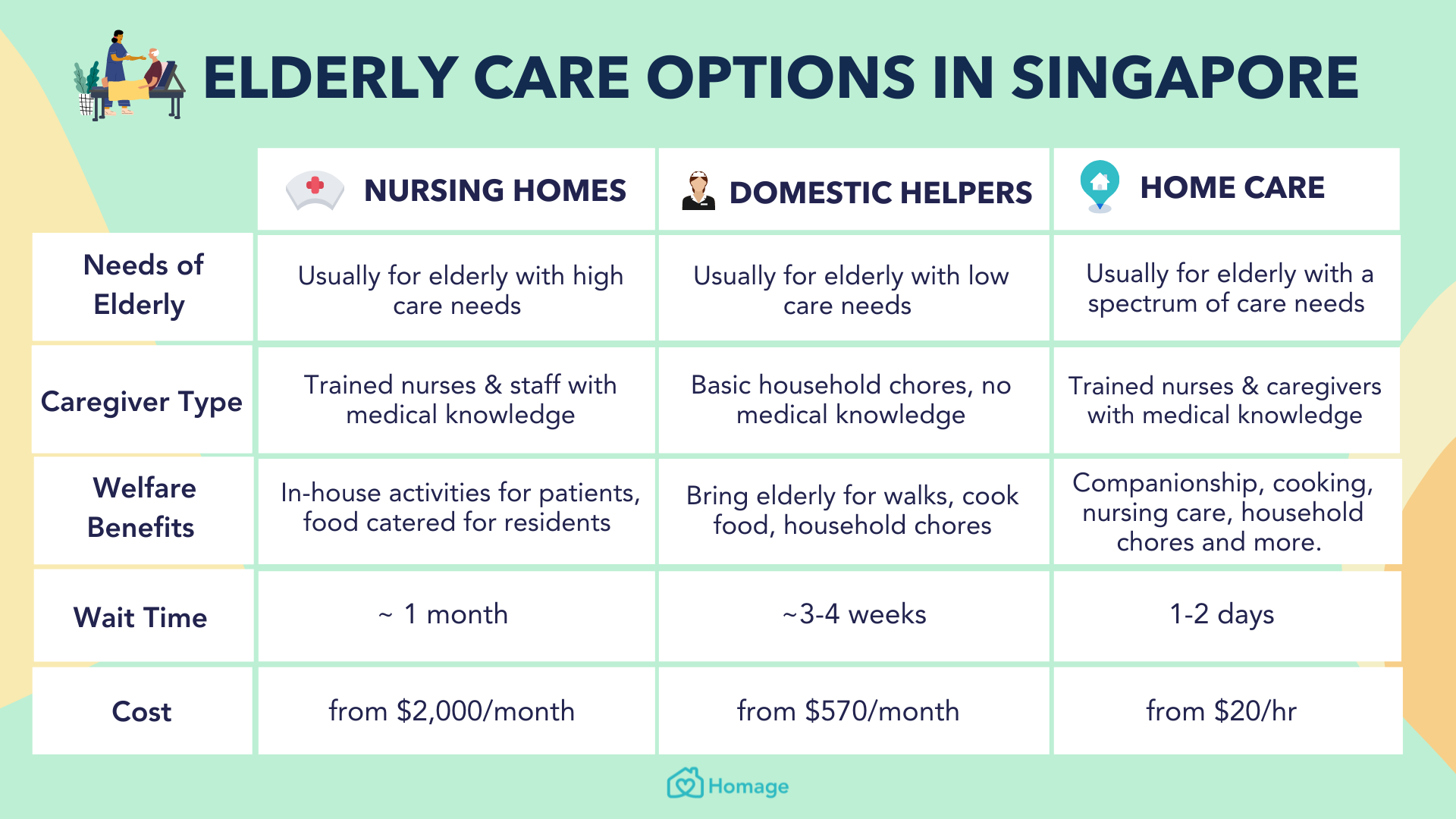
Depending on the severity of the fall, there are several considerations to bear in mind when arranging for care after the fall, such as how long expected help is required, and your loved one’s mobility (e.g. bedridden or wheelchair-bound).
If your loved one was hospitalised for a serious fall, chances are they would require additional help with mobility or may require additional medical care. Post hospitalisation care options may include community hospitals, home care, or a live-in helper.
If your loved one did not require further medical intervention and is still able to move around and get by, talking to them about the fall and ensuring follow-up with your doctor is important. It may be useful to consider whether home modifications are needed to prevent future falls is needful and necessary as well.
Preventing Future Falls
After a fall, it would be important to ensure your loved one’s safety by taking measures to prevent future falls. This would help them to feel secure, and create peace of mind for yourself too. Although your loved one may be safe this time around, falls can result in serious consequences such as disability, pain, loss of independence and premature death even. There are several factors and issues to look into in preventing future falls, and they pertain to environmental conditions your loved one lives in, and personal factors such as your loved one’s health, or individual factors like their lifestyle habits.
Fall-proof your home for your loved ones
Most cases of falls from the elderly happen at home. To ensure that your loved one is living safely at home, you can book an In-Person Care Assessment (IPCA) with Homage.
During the IPCA, our Care Specialist will assess your home to ensure that there are no fall risks. We will also recommend the optimal places to place assistive devices to ensure that your loved one is able to move around easily.
Environmental Factors
Many falls occur at home. There are some risk factors at home which could result in a greater risk of falling, such as:
Flooring
Some flooring surfaces are uneven and have slippery surfaces which increase the risk of falling. Unsecured carpets and rugs may make it easier for someone to trip and fall as well. In the bathroom, the floor is usually slippery. Sometimes, objects may be left around the house on the floor which causes tripping.
Loose Cords and Wires
Cords and wires lying about the house can pose a safety hazard. They are positioned on the floor, making them less visible. This can lead to a potential threat of falling down.
Poor Lighting
Dim lighting can make visibility poor, resulting in someone losing their step.
Furniture Design
Some homes are double-storey and have steps which may be poorly designed. Also, furniture like chairs or beds may be too high or low, which may result in awkward bending over and a greater chance of tripping and falling.
Some ways to mitigate these risks would be to:
Flooring
Ensure rugs and carpets are properly secured and do not lay items on the floor – clean them up and put them in their proper place. Install grab bars in bathrooms so that your loved one can use them for support, and place non-slip mats on bathroom floors to prevent slipping.
Loose Cords and Wires
Tie up the cords and wires, and do not leave them on the floor.
Poor Lighting
Put a nightlight in bedrooms in the event your loved one wishes to use the bathroom at night. Ensure lights are not dimmed and are bright enough so that everyone can watch where they are going.
Furniture Design
Choose steps with a handrail for support. Get chairs and beds which are the right height for your loved one.
Health Factors
Older people, once having fallen, are more susceptible to future falls. Arrange for your loved one to get assessed by a doctor, as falls could sometimes be indicative of possible emerging medical issues which may require attention, such as dehydration or a urinary tract infection.
The doctor should check on your loved one’s recovery status, and examine his or her overall health and vision. A comprehensive and well-rounded evaluation could uncover potential issues with your loved one which could have made falling more likely to occur. Even if your loved one feels that they are fine and do not need to go, do remind them that seeing the doctor is a crucial step in staying safe and will help to prevent future falls to avoid the pain and discomfort from it as well.
Some elderly may face greater fall risks due to several health factors as well, such as:
- Weakness, imbalance and poor coordination
- Impaired cognition in certain conditions e.g. dementia
- Medical conditions that affect vision, muscle strength and reflexes (e.g. Parkinson’s disease, osteoporosis, cataracts, glaucoma)
- Taking medications that cause unsteadiness or affect balance, vision and alertness (e.g. sedatives, blood pressure drugs)
If your loved one has an unsteady gait, it may be helpful to consider a mobility device to help them get around more safely, and retain their independence still.
Individual Factors
For your loved one, some individual factors such as:
Poor Vision
If your loved one’s prescription lenses are out of date, they may cause blurry vision and lead to falls.
Wrong Footwear
Some elderly may not wear shoes which fit them well or shoes with poor grip. These could result in falls.
Exercising and An Active Lifestyle
Exercise helps one to stay fit and healthy, and also be better equipped to cope with a fall. With exercise comes strength, which is key in aiding in preventing falls.
You can help your loved one by:
Poor Vision
Get them to see an optometrist regularly to assess their eyesight and ensure their spectacles are correctly fitted for them.
Wrong Footwear
Get proper shoes which fit well.
Exercising and An Active Lifestyle
Instil an exercise routine for your loved one, and find something they enjoy doing. For seniors who are recovering from a fall or injury, they are at higher risk of future falls. Because of this, it is important to be proactive in building up their strength and confidence in walking around the house again. Encourage them to get up for light exercise and activity to improve balance and stability.
Falls among the elderly can lead to a loss of confidence, making daily activities daunting. This is where elderly care becomes essential – ensuring safety measures are in place while encouraging gradual return to regular activities are crucial steps toward recovery. Just as managing fall risks is vital, maintaining overall health is essential for older adults, particularly those managing chronic conditions like diabetes. Implementing small, daily habits can significantly aid in controlling diabetes, ensuring a healthier lifestyle. Read our blog to explore practical steps and strategies for elderly elderly diabetes management.
